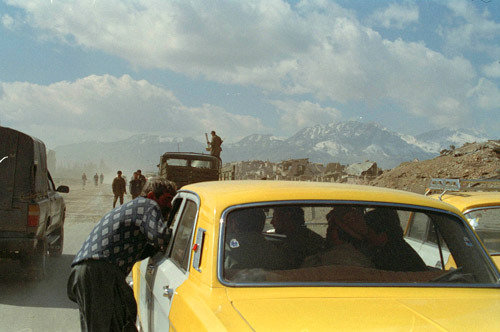Poppy
dal 30/3/2012 al 9/6/2012
Segnalato da
30/3/2012
Poppy
Nederlands Fotomuseum, Rotterdam
The unique project Poppy contains work that was assembled over the past 20 years by Antoinette de Jong and Robert Knoth. They travelled along the trade routes following Afghan heroin, and reveal the darker side of globalization in an impressive way. The exhibition presents their report as a multi-screen installation. Poppy shows how the poppy flower creates a web of chaos, violence and destruction.

The unique project Poppy contains work that was assembled over the past 20 years by Antoinette de Jong and Robert Knoth. They travelled along the trade routes following Afghan heroin, and reveal the darker side of globalization in an impressive way. Their journey begins in Afghanistan, and they take us along to Central Asia, the Balkans, Somalia and England. The Nederlands Fotomuseum is showing their report as a multi-screen installation. Poppy shows how the poppy flower creates a web of chaos, violence and destruction. A publication with the title Poppy: Trails of Afghan Heroin will be appearing simultaneously.
No one goes to Afghanistan only once
The saying ‘No one goes to Afghanistan only once’ certainly applies to the makers of this report, who maintain a cordial relationship with that country. After their first visits in the early 1990s Knoth and De Jong returned many dozens of times to cover developments in the country for Dutch and international media. Afghanistan is the recurrent pivot in Poppy; a decade after 9/11 the war there has become a regular part of out daily news. Yet for many it is not clear why the Dutch army is still there. Proposals for contributions to the development of Kunduz, Uruzgan, or sending police trainers invariably to bitter debates in politics and the media.
Trails of Afghan heroin
Antoinette de Jong and Robert Knoth take us with them from Afghanistan, where poppy flowers colour the fields, to the grey alleys behind Brick Lane in London, where the drugs are sold to the end users.
In the 1980s opium and heroin were trafficked for weapons in the battle against the Soviets. The fall of the communist regime in Kabul, in the early 1990s, was followed by a bloody civil war, and the cultivation of the opium poppy took off sharply. Today the country produces 90% of all the opium in the world, with all the consequences that follow from that. As the UN office on Drugs and Crime, “Yesterday's silk route has changed into a heroin route which threads a path of death and violence through one of the worlds most strategic, but also most explosive regions.” The impact on countries and regions along the route is disastrous: the HIV/AIDS epidemic in the Ukraine; the battle of the Tadzhik narcotics police against the superior power of the drug traffickers; the corruption in Albania; border cities like Maastricht that experience problems from drug runners. The cold figures speak for themselves: the heroin trade is worth 68 billion dollars per year; 15 million people use opiates. Worldwide 100,000 people die every year as a consequence of heroin use.
“Either we destroy poppies or poppies destroy us.” - Afghanistan’s President, Hamid Karzai, 2006 -
Poppy poses questions: Often the war in Afghanistan is regarded in isolation, but if you look from a different perspective, does that also change the image of the war there? Why is it so difficult to resolve conflicts like that in Afghanistan? Are there similarities with the cocaine wars in Central and South America, for instance?
Poppy connects the dots on the world map and reveals the underlying and increasingly complex patterns of our globalizing society. It's blessings are evident, but the down side of the globalization process is that terror groups, drug cartels and criminal states increasingly make use of the possibilities that globalization offers and are becoming intertwined with one another to a greater extent. They are part of a worldwide shadow economy that has grown explosively over the past two decades.
Poppy is able to expose this reality with its shocking, beautiful and raw photos, films, interviews and sound bites. In doing so, the project ingeniously links the poverty of Afghanistan with the wealth of Dubai and the disadvantaged neighbourhoods of Western European cities.
Kaleidoscopic impressions
In the multi-screen projection the viewer will encounter photography, video, audio and animations. The photo material includes both black and white and colour images, from 35mm and larger formats, landscapes, portraits, news photographs and more abstract images, in addition to reflective photography. The material collected provides a kaleidoscopic impression and illustrates the chaos, urgency and elusiveness of what takes place along the route. Several stories run through each other, sometimes parallel, sometimes crossing one another imperceptibly, but always influencing each other. The encounters and observations recorded by Knoth and De Jong offer a remarkable perspective on the international developments that have dominated the news for two decades.
In their travels Knoth and De Jong visited the following twelve countries along the 'poppy trail': Afghanistan, Tadzhikistan, Kyrgyzstan, Pakistan, Russia, Ukraine, Albania, Kosovo, The Netherlands, England, Dubai (UAE) and Somalia.
Exhibition
Produced and curated by Nederlands Fotomuseum and Paradox | Installation design Peter Claassen (images) and Mark Glynne (sound) | Graphic Design Kummer&Herrman
Image: © Robert Knoth / Antoinette de jong
Debate and Opening: Saturday, March 31 at 15-19
Nederlands Fotomuseum
Wilhelminakade 332 - Rotterdam
Hours: Tuesday to friday 10-5 p.m.
Saturday & sunday 11-5 p.m.
Entrance fee: Adults: € 7
Children under the age of 13: free entrance
Museumkaart, Jaarkaart Fotomuseum, ICOM: free entrance
Students/CJP € 3,50
Groups (> 15 p.) € 3,50
Free admisson on Wednesdays
Free tour: Every Sunday 2 p.m.: free guided tour. You can register at the same day at the museum desk (full = full).



